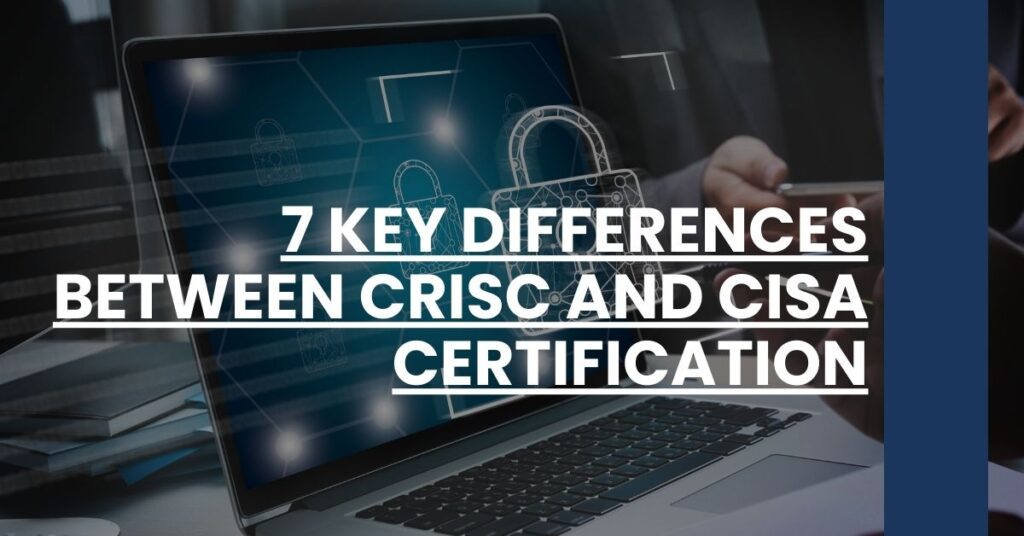Are you torn between CRISC and CISA certifications for advancing your IT risk management or auditing career?
In the evolving landscape of information systems, choosing the right certification can be pivotal.
Our article deciphers the crisc vs cisa debate by articulating the distinctive facets of both, guiding you through their unique industry demands, exam prerequisites, and the impact each has on your professional trajectory.
- 1. Understanding the Focus Areas
- 2. Examining the Certification Requirements
- 3. Career Path and Job Opportunities
- 4. Understanding the Exam Content
- 5. Comparing the Difficulty Level
- 6. Evaluating the Continuing Education Requirements
- 7. Analyzing the Cost Implications
- Relationship With Other IT Security Certifications
- Industry Recognition and Value
- Conclusion: Which Certification Should You Pursue?
1. Understanding the Focus Areas
When you’re confronted with the decision of CRISC vs CISA, it’s crucial to have a laser-focused understanding of what each certification entails. Both are IT-based but diverge on critical competencies that cater to distinct professional realms.
- Essence of CRISC: Certified in Risk and Information Systems Control (CRISC) homes in on the multifaceted discipline of risk management. It empowers you with the ability to identify and manage enterprise IT risk, and to implement and maintain information systems controls. Strong risk management is indispensable in today’s business landscape, and a CRISC certification places you at the forefront of this crucial area.
- Core of CISA: Certified Information Systems Auditor (CISA), on the other hand, is the gold standard for those who oversee and assess an organization’s information technology and business systems. It includes auditing, control, and assurance capabilities, with a bedrock emphasis on ensuring that systems are secure, controlled, and effective. CISA is deeply woven into the fabric of IT audit professionals, embodying a benchmark for their knowledge and practices.
Grasping this fundamental divergence will help tailor your career towards your strengths and inclinations. Are you more intrigued by the strategic approach of mitigating risks, or does the systematic integrity of IT systems captivate you? Each certification not only sharpens specific skills but inevitably leads you down very different professional paths.
2. Examining the Certification Requirements
In your journey of comparing CRISC vs CISA, perhaps the most concrete differentiators are the eligibility requirements. Both demand a blend of education and boots-on-the-ground experience, but there’s a distinct divergence in their prerequisites:
- CRISC Prerequisites: Before taking the CRISC exam, you’ll need at least three years of experience in at least two of the four CRISC domains. ISACA allows no substitute for this experience – it’s a non-negotiable that ensures each candidate has a seasoned grasp on risk management tasks.
- CISA Prerequisites: For CISA, the road is a bit longer with a requirement of five years of professional experience in information system auditing, assurance, or security. Don’t fret if your background is a bit more unconventional; there are opportunities to waive off up to three years of this requisite based on academic or professional supplementary experiences.
Each certification mandates that your experience is both recent and relevant, ensuring that when you claim that badge of honor, you’re genuinely at the top of your game. Taking a decisive step in your professional journey means meeting these thresholds head-on.
3. Career Path and Job Opportunities
Now, let’s ponder over the career opportunities that spring forth from CRISC and CISA certifications. These aren’t just acronyms to add to your resume; they’re launchpads into specialized fields within IT.
- CRISC Career Navigation: Think CRISC, think versatility. You could find yourself as an IT Risk Management Specialist, a Chief Information Security Officer, or even a Business Analyst. Positions like Risk Advisor, Risk and Compliance Manager, or Control Analyst could also be within your grasp. Each of these roles deals with the nuanced shades of risk within the IT environment, emphasizing the need for holistic, strategic insight.
- CISA Job Exploration: CISA aligns more directly with the auditing sphere. You might embark on roles such as an IT Auditor, Compliance Project Manager, or an Assurance Professional. Auditing Information Systems, protecting critical information assets, and advancing within roles like IS Auditor Manager or Consultancy are pathways that deeply intertwine with CISA’s body of knowledge.
Choosing between CRISC and CISA is more than picking a certification; it’s shaping the trajectory of your career. The doors that open for you upon achievement could lead to very different corners of the IT industry.
4. Understanding the Exam Content
The CRISC versus CISA decision mirrors in their exam content, each designed to gauge your mastery in their respective fields. Knowing what lies within these exams aids you in choosing what aligns best with your intellectual curiosities and professional desires.
- Digesting CRISC Content: The CRISC exam delves deeply into four domains: IT Risk Identification, IT Risk Assessment, Risk Response and Mitigation, and Risk and Control Monitoring and Reporting. It examines your capacity to assess enterprise risks as well as design and implement risk-based programs.
- Unpacking CISA Content: The CISA exam frames its curriculum around five domains. You’ll tackle Information System Auditing Process, Governance and Management of IT, Information Systems Acquisition, Development and Implementation, Information Systems Operations and Business Resilience, and Protection of Information Assets. This structure is crafted to gauge your expertise in audit standards, practices, and system vulnerabilities.
Each certification’s exam is a rigorous test of your domain-specific knowledge, ensuring that you have the needed depth in your chosen area. So, select the exam content that resonates with your intellectual drive and take a dive into the richness of its subject matter.
5. Comparing the Difficulty Level
Diving into the debate about the difficulty level in the matchup of CRISC vs CISA is an exploration of subjective landscapes. However, useful insights can steer your preparation efforts in the right direction.
The difficulty of an exam is a personal encounter, often directly proportional to your familiarity and comfort with its content. There’s speculation within the professional community regarding which exam presents the steeper climb:
- Pondering CRISC’s Rigor: Some claim that CRISC’s focus on risk management, with its requirement for strategic decision-making and control design, might challenge those more accustomed to granular technical work.
- Assessing CISA’s Tenacity: Others argue that CISA’s broader scope in governance and auditing, combined with its regimented standards and protocols, might test the mettle of even the most detail-oriented professionals.
Your personal background and work experience are pivotal in the difficulty spectrum—where you stand on your journey defines the degree of challenge. Endorsements from the certification community suggest that neither is objectively tougher than the other; it all hinges on how well-aligned your expertise is with the core material of each certification.
6. Evaluating the Continuing Education Requirements
When you’ve already climbed the mountain to earn your CRISC or CISA certification, you’ll need to maintain the altitude by fulfilling Continuing Professional Education (CPE) requirements. Just like a pilot needs ongoing flight hours to keep their skills sharp, certified professionals in risk and auditing must stay up-to-date with the latest practices and technologies.
- CRISC CPE Stipulations: Maintaining the CRISC credential requires at least 20 CPE hours annually, and a minimum of 120 CPE hours in a fixed 3-year cycle. This continuous education is a commitment to excellence—ensuring you remain relevant and effective in managing IT risks.
- CISA CPE Conditions: Similar to CRISC, CISA certification also calls for 20 CPE hours each year, culminating in 120 hours over a three-year period. As standards and technologies evolve, so too must the knowledge of a CISA professional.
Although these requirements might seem daunting, they’re powerful incentives to continue learning and growing within your field. Consider them a structured pathway to ensure you’re consistently at the cutting-edge of your specialization, a beacon for others to follow.
7. Analyzing the Cost Implications
Every investment in your professional development comes with its price tag, and this includes the pursuit of CRISC or CISA certifications. However, when analyzing crisc vs cisa from a cost perspective, it’s an appraisal of value over expense.
- CRISC Costs: Enrollment for the CRISC exam itself can set you back a significant amount, not to mention the additional costs for study materials and perhaps formal review courses. Furthermore, the annual maintenance fee is a recurring expense you need to anticipate as part of your budget.
- CISA Expenditures: The CISA certification entails a similar financial commitment, with exam fees, preparation materials, and ongoing costs for maintaining the credential through CPE activities.
Remember, while the initial monetary output might seem steep, it’s an investment that could yield substantial returns in the form of career advancement and salary increases. In the crisc vs cisa discourse, evaluate not only the upfront cost but also the future benefits each certification can unlock.
Relationship With Other IT Security Certifications
In the broader picture of IT security credentials, where do CRISC and CISA fit? It’s essential to consider how these certifications align or diverge with others in the field, such as CISSP or CEH.
- Complementing Other Certifications: Both CRISC and CISA can be stepping stones or supplements to other certifications. A CRISC-certified professional might pivot towards policy-making thanks to its risk-focused curriculum, while a CEH could target the technical side of security.
- Unique Advantages: Each of these certifications, including CISSP, carries its unique advantages and appeals to different professional niches. For example, your CRISC credential stresses your adeptness in risk management, while CISA underlines your comprehensive knowledge of auditing information systems.
Positioned well, CRISC and CISA can complement your existing credentials or provide a specialized focus that enhances your career prospects. Their relationship with other certifications isn’t one of rivalry but of strategic synergy.
Industry Recognition and Value
When traversing the crisc vs cisa landscape, the value and recognition each certification commands in the industry are bright beacons that should guide your decision. Here’s a snapshot of how they stand:
- CRISC’s Market Value: CRISC certification often comes with a significant salary uplift, reflecting average earnings that are a lucrative draw. Being one of the top certifications in IT governance, risk and compliance sectors implies a high degree of respect and demand for CRISC-certified professionals.
- CISA’s Industry Esteem: Similarly, CISA certification is no slouch in the earnings department, with professionals enjoying handsome pay in their specialized auditing roles. Its long-standing presence and alignment with industry standards have cemented its standing as a revered accreditation.
This recognition translates into tangible career privileges, such as better job opportunities, a stronger negotiating position for raises or promotions, and a badge of expertise that’s understood worldwide.
Conclusion: Which Certification Should You Pursue?
The journey through the nuances of CRISC vs CISA boils down to a personal crossroads. Each path carries its distinct rhythms; risk management or auditing, strategic or compliance-focused, they cater to different heartbeats in the IT world.
Reflect on the variables discussed:
- Career Impact: What doors will each certification open for you?
- Professional Goals: Which aligns better with your long-term vision?
- Learning Preferences: Do the subject matter and continual learning excite you?
- Investment Worth: Is the return on investment clear in your career trajectory?
In the end, whether you’re drawn to the analytical rigor of CISA or the strategic breadth of CRISC, the certification you choose should not only reflect where you are today but also the pinnacle you aspire to reach. The road is yours to choose, and the horizon is wide open with possibilities.

